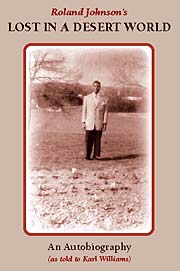
AN AUTOBIOGRAPHY (as told to Karl Williams)
Massey-Reyner, 1999
EXCERPTS:
- From the Foreword (by Karl Williams)
- Childhood
Return to Books
Foreword:
People who produce autobiographies often have no need that their significance be explained. But unless you are familiar with something called the self-advocacy movement, chances are you have not heard the name Roland Johnson before.
The fact that was central to Roland Johnson's history - and so to the contribution he made during his lifetime - was that he had a disability, what was called during his life - and is still often referred to as - mental retardation.
In the white male Eurocentric world of the last few centuries women and people whose skin happened not to be white were considered somewhat less than fully human - those in control did not expect anything of value to come from either direction.
If in this century those prejudices have begun to disappear, there is still prejudice enough left to fill in.
You are now holding in your hands a book in which a man who had mental retardation tells about his life. Between these pages is all the evidence anyone should need to convince them that there is most definitely something of value to be found in people with this disability. It may be difficult to put into words exactly what that something is. It has nothing to do with what we now define as intelligence - or with wealth or power or physical attractiveness. People with this disability by definition have a lower than average IQ; they are also usually poor, powerless, and by the world's standards somewhat less than attractive physically. But because it may be a bit elusive, this contribution they have to make - this world we find ourselves living in today being so completely driven by intellect, money, power, and beauty - because this contribution may be difficult to put one's finger on, that does not mean that it does not exist.
When I met Roland Johnson he was the president of Speaking For Ourselves, a group of self-advocates, i.e., people with disabilities engaged in the newest outcropping of the civil rights movement.
I write songs; I heard a keynote speaker at Speaking For Ourselves' annual conference ask how there could be a movement without music; and I suggested that I try writing a song for them.
They asked me to come and meet with them to talk about my proposal.
It was a most unusual scene…
Childhood:
I smelled biscuits. She would make up her dough and put yeast in the dough and let it sit overnight and all that dough would rise and in the morning she would come down and you could smell the biscuits cooking. And all the neighbors would walk by and smell this good food cooking. They’d say, “Grace, what’s that smell; it smells very good; could we have some?” She would make that homemade bread and she would just be in there cooking — cooking and cooking while the girls would still be sleeping and I would be awake.
She got up I’d say around about six o’clock, ‘cause my father had to go out and work. And during the school days we had to get up early, ‘cause we had to be ready at a certain time for school. And special in the mornings she had grits, and scrambled eggs, and pancakes, and bacon, and scrapple, and stuff like that. Biscuits was my favorite smell. We used to just put some syrup over the cornbread.
The house was big - three bedrooms, kitchen, dining room. My mother, my father, all six girls and three boys. Then we moved up on Cleveland Street from South Philly. We had rats crawling around down South Philly on Elsworth Street and we got another house in North Philly, 2435 North Cleveland Street. I remember that. We moved from Elsworth Street to North Philadelphia. My father was looking for another house anyway, because with all them children you gotta have another house.
When we was living down on Elsworth street, the girls would be playing when my mother would go out to work, and they’d roll up the toilet paper and get a spoon and wet the toilet paper and throw it at the next door windows, throw the toilet paper cross people’s alley at people’s windows. That’s how close the houses was. And my mother said, “Where’s all this toilet paper gone?” She didn’t do nothing with the girls; she just said, “You girls go down to the store and get me some more toilet paper!” They would just be up there just wasting up toilet paper. I wouldn’t have no parts of that. All I was doing was busy eating up the food.